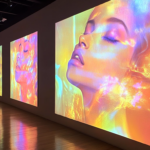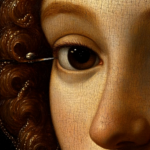AI is reshaping the way music is composed, produced, and enjoyed, paving the way for a new era in soundtrack creation. Whether it’s for films, video games, advertisements, or personal playlists, AI is changing how artists and producers approach music, blending human creativity with machine intelligence. By analyzing countless compositions, AI can generate harmonies, beats, and even lyrics, providing artists with endless possibilities for crafting soundscapes that resonate deeply with audiences.

1. How AI is Reimagining Music Composition
AI is empowering musicians to experiment with new sounds, genres, and styles. Through machine learning algorithms trained on vast libraries of music, AI tools can generate melodies, harmonies, and even complete tracks. This creative boost allows musicians to explore innovative compositions that might not have been possible otherwise. AI-driven platforms like AIVA and OpenAI’s MuseNet are capable of producing everything from classical symphonies to contemporary pop, providing a new tool for artists who want to push their creative boundaries.
AI tools also enable composers to produce music that’s specifically tailored for diverse media, such as film scores or video game soundtracks. For instance, AI-generated music can adapt dynamically to in-game scenarios, enhancing the player’s experience by aligning sound with on-screen action. This level of precision and responsiveness opens up new artistic possibilities that cater to audiences in ways traditional music composition couldn’t.
2. Personalized Soundtracks with AI
One of AI’s most exciting contributions to music is the ability to create personalized soundtracks. With streaming platforms and music apps incorporating machine learning, users can now enjoy playlists that cater precisely to their mood, preferences, and activity. By analyzing listening habits and context, AI can tailor music selections, allowing listeners to experience soundtracks unique to their tastes.
In addition to personal playlists, AI is also enabling real-time music generation. Think of a fitness app that generates upbeat, motivating music based on your workout intensity or a meditation app creating calming tunes based on your breathing patterns. This customized approach is changing how people interact with music, making it an integral part of daily life.

3. Breaking Down Barriers for Independent Artists
AI music creation tools are making it easier for independent artists to produce high-quality tracks without needing access to expensive recording studios or professional producers. With AI, artists can produce, mix, and master their music at a fraction of the cost. Tools like LANDR offer automated mastering, allowing artists to fine-tune their songs to perfection. AI-assisted composition tools help musicians translate ideas into full tracks, democratizing access to music production and enabling a more diverse range of voices in the industry.
The rise of AI in music production is also creating new career opportunities for artists, as they explore roles in curating, fine-tuning, and enhancing AI-generated tracks. Musicians now find themselves collaborating with technology in innovative ways, whether by refining AI-generated harmonies or using AI as a creative partner.
4. The Future of Live Performance and Immersive Experiences
AI is not only impacting recorded music but is also revolutionizing live performances and immersive experiences. Musicians and sound engineers are using AI to create visuals and sounds that respond to the audience’s reactions, making concerts more interactive and engaging. Through wearable technology, AI can detect audience members’ emotions, adjusting the music in real-time for a more immersive experience.
Moreover, AI is being used in virtual concerts and augmented reality music experiences. For instance, AI-driven avatars of famous musicians can perform on virtual stages, and interactive apps let fans engage with AI-created songs in real-time. This technology could make live performances accessible to millions more fans, transforming the traditional concert model into something entirely new.

5. Ethical and Creative Questions in AI Music
With the rise of AI-driven music, new questions emerge around creativity, originality, and copyright. While AI can generate stunning compositions, there’s debate over whether such music can truly be “original” if it’s based on past works. Additionally, as AI takes on a larger role in music production, artists and developers are considering how to safeguard human creativity in a landscape increasingly dominated by machines.
AI has sparked dialogue on the ownership of AI-generated compositions and whether they should be classified as original works or reproductions. As the industry navigates these questions, musicians and audiences alike are learning to appreciate AI as both a tool and a partner in creativity.
6. AI and the Evolution of Sound
As AI continues to evolve, so too will its influence on music. The synergy between human emotion and machine precision is pushing the boundaries of what music can achieve, creating soundtracks that are increasingly immersive, personal, and resonant. For artists, producers, and listeners alike, AI promises a future of endless musical possibilities that may redefine how we think about music composition and its role in our lives.
AI in music offers a bold new frontier. It’s an era where artificial intelligence doesn’t replace human artistry but rather elevates it, crafting soundtracks that not only entertain but inspire listeners around the globe.
By Stanislav Kondrashov



